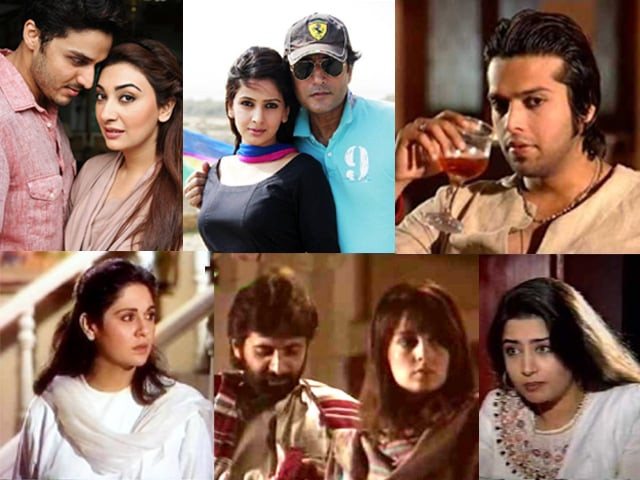From pregnancies to abortions, from extra-marital affairs to illegitimate children and elopements, we have been exposed to all kinds and degrees of absurd content in these dramas in the name of modern entertainment. Even respectable relationships are not spared. I have seen countless dramas where a guy falls in love with his niece or his daughter’s friend or a girl starts having an affair with her brother-in-law, and uses all sorts of ploys and unfair means to make him her life-partner. These dramas even show maids being used as objects of physical pleasure and satisfaction by their male employers.
These are only a few examples of all the absurdities that we are being entertained with in the form of dramas like Mera Saaein, Maat, Kitni Girhen Baqi Hain, Tair-e-Lahoti, Mujko Khuda Pe Yaqeen Hai, Maane Na Yeh Dil – the list can go on and on.
 Mera Saaein was the story of a traditional feudal lord and politician with insatiable desires of women, power and wealth. Photo: Official Facebook page
Mera Saaein was the story of a traditional feudal lord and politician with insatiable desires of women, power and wealth. Photo: Official Facebook pageOne entertainment channel even went to the extent of showing an apparently unmarried couple living under the same roof as husband and wife in Rishtay Kuchh Adhooray Se.
And then of course is the foreign content – Turkish dramas dubbed in Urdu – to entertain the audience. This is an obviously low-cost business strategy adopted by our channels. Our local artists and directors have raised their voice against the airing of foreign content on our TV channels and this is a much needed-step. However, no considerable objection has been raised on the declining quality of our own productions.
 Turkish dramas have taken over our entertainment channels. Photo: File
Turkish dramas have taken over our entertainment channels. Photo: FileAnd yet, Juggan Kazim’s op-ed in The Express Tribune brought a flicker of hope amidst this declining trend in the entertainment industry. Her effort is quite commendable as she categorically states her opinion on the matter:
“There is the decaying drama industry that seems to focus mostly on the affairs of married people. The stories are awful and the production values are worse. There is little regard for character development…”
The argument given is always the never-ending race for increasing ratings. However, this doesn’t seem to be a sane or rational argument. After all, even in the PTV era when there were no private channels in our country, we had popular and successful dramas – perhaps more than any drama serial of today – that would have the audience glued to their TV lounges at 8pm every day.
Dramas like Tanhaaiyan, Alpha Bravo Charlie, Aanch, Dasht, Aroosa, Dhuwaan, Sitara aur Mehrunnisa, Marvi, Des Pardes and Bandhan are only a few of the famous ones from that time.
Such was the appeal of these dramas that they were viewed and appreciated not only in Pakistan but also by people abroad. To me, this is sufficient evidence that even whilst staying within our social and cultural norms, we can produce content that is welcomed by a wide variety of audiences.
By following in the footsteps of international media, we are intentionally or unintentionally destroying our own culture and consequently, losing our identity. This obsession with competing with something that does not represent us – as far as our social values and culture is concerned – needs to be addressed on an urgent basis because it has a direct influence on the mindset of our younger generation.
How will we stop our youngsters from doing certain things or behaving in a certain way if that is the behaviour propagated (and hence, justified) by the media?
 Mujhe Khuda Pe Yaqeen Hai was the story of how a girl tried to humiliate her fiance with false claims only to marry his US-return brother. Photo: Official Facebook page
Mujhe Khuda Pe Yaqeen Hai was the story of how a girl tried to humiliate her fiance with false claims only to marry his US-return brother. Photo: Official Facebook pageThe media industry must realise the impact such things can have on our society. All those associated with this industry have a huge responsibility on their shoulders to mend their ways for a better society.
Since the Pandora’s Box is already open, it won’t be easy to fix the problem quickly.
But one of the steps that can be taken immediately by the media is to start having Parental Guidance (PG) ratings for all the shows being aired by our TV channels so that the viewers can at least know which category the program they intend to watch falls under.
Jim Morrison once said,
“Whoever controls the media controls the mind.”
While Allen Ginsberg went a step forward and said,
“Whoever controls the media, the images, controls the culture.”
Hence, people need to understand that it is in their hands whether they allow the media to control their minds, their perceptions and ultimately their culture or not. It is essential for audiences – the grown up category of the masses who are mature enough to differentiate between right and wrong – to let the entertainment industry know what is acceptable and what isn’t.
After all, media content is based on what viewers want to see. So if viewers voice their concerns vehemently enough, if they boycott certain channels or certain programmes the ratings are bound to drop.
Our channels will then have no choice but to abstain from airing content that is so unwelcome by the masses.



COMMENTS
Comments are moderated and generally will be posted if they are on-topic and not abusive.
For more information, please see our Comments FAQ